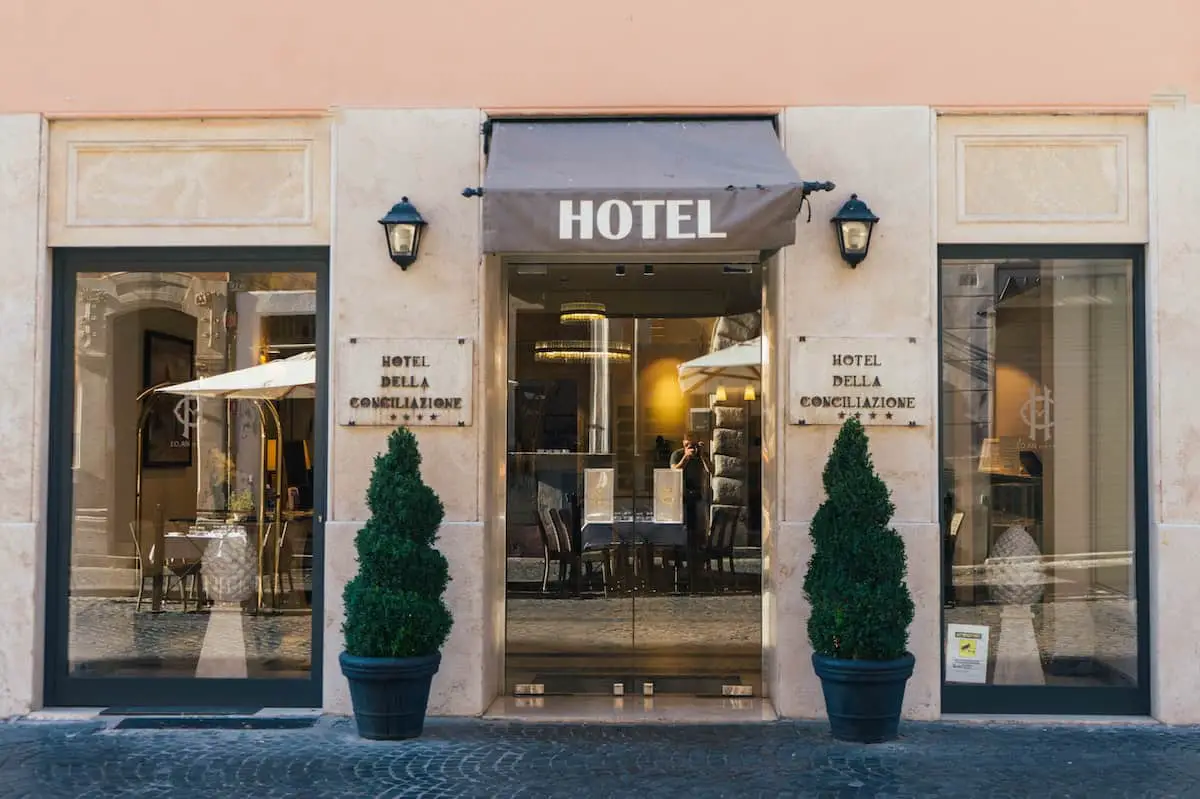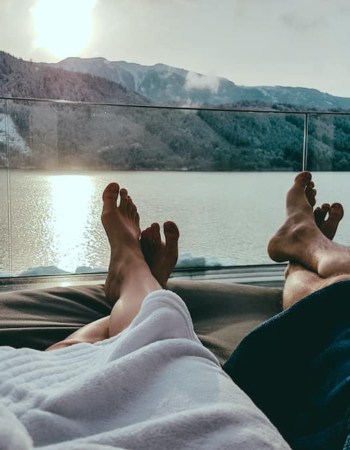Accommodation plays a crucial role in how satisfactory the traveling experience is. If you are traveling the world and looking for the best accommodation solutions, be those mainstream or alternative, this article is for you.
There are 13 types of travel accommodation you can try depending on what you are aiming for:
- Hotels
- Hostels
- Resorts
- Rental apartments
- Holiday homes
- Cottages
- Cabins
- Treehouses
- Homestays
- Guesthouses
- Castles
- Camping sites and camping villages
- Boutique accommodation
- Farmstays
- Ethno villages
- Couchsurfing
If you are curious to learn what types of accommodation there are, as well as what you can expect from each, keep reading. Let’s dive into it.
What Are the Types of Accommodation?
Different types of accommodation are standardized places, recognized for their unique services and characteristics. Each is different than the other in some aspects and each has subtypes. These differences are found in size, location, services, and facilities an accommodation can offer.
To make the distinction easier, we have prepared a well-rounded list of commonly booked accommodation types that travelers can find. Some, such as hostels, are frequently booked, while others are rarer to find. These are the types:
Hotels
Hotels are a common type of overnight travel accommodation worldwide. They provide rooms with private bathrooms, and meals, along with entertainment, recreation, and spa facilities, depending on their star ranking. The higher the star ranking, the better the service and the greater the spectrum of activities.
Hotels usually offer short-term accommodation for travelers. However, the length of stay in a hotel while traveling depends on legislation and specific terms and policies of that place. They offer comfort and have more staff members ready to cater to the needs of hotel guests. Their size, functionality, and special perks drastically vary, and so do the hotel management and reputation among travelers.
Hostels
When you chose to stay in a hostel, you can expect to share living and sleeping spaces with strangers and fellow travelers from across the globe. While they offer private rooms like hotels, hostels are known for shared dorms that accommodate more travelers in the same space. Most hotels are based on self-serving principles when it comes to making food or ironing clothes.
They have one of few common areas, such as shared bathrooms, kitchen, balcony, leisure, and workspace. Dorms can be mixed, male or female and the number of beds can vary and go anywhere from 4 to 20 or more.
Resorts
Resorts are similar to hotels, but usually have much more to offer in terms of indoor and outdoor space and recreational areas. What you can find in a resort exceeds simple room and diner service. These are mini travel destinations of their own and are meant to give their visitors all that they need while traveling in one palace. This includes bars, private resort beaches, resort nightclubs, and ski spots to name some.
Rental Apartments
Rental apartments are a chance to live like a local in a municipality of your choice. These are rental spaces for short-term stays with all perks that a home can offer – full privacy, and access to all property facilities. They are equipped with the same facilities you’d have in your apartment and give you maximum freedom for using all that the space offers. With that in mind, dining, additional services such as laundry and dining, as well as organizing fun activities are all on you.
Holiday Homes
Rental homes are the closest to a home-like atmosphere you can get when traveling. Both ensure maximum comfort and freedom, allowing you to use living areas if it was your own during your stay. As such, they are particularly suitable for traveling with family and in smaller groups.
While apartments are suitable for city breaks and business trips and are typical for urban areas, holiday homes frequently offer both the convenience of a backyard, and a chance to stay in a city periphery, small villages, or towns. You can find anything from regular houses to villas and haciendas. Travelers on Tripadvisor even suggest that renting holiday homes can be a great solution even if you are a solo traveler.
Cottages
Cottages are commonly found in the countryside. These are small rural vacation homes that can be rented directly from the owner or from rental agencies. Most are humble, and suitable for getaways from urban life. They offer a decent level of comfort, a chance to connect with nature, and an opportunity for a peaceful vacation in the countryside.
Cabins
Cabins are small wooden holiday homes, usually built in the woods, near lakes, and other bodies of water. They can, but don’t have to be located in extremely secluded areas and can vary in size and amenities. They are especially suitable for adventurers, nature lovers, and families looking for a laid-back holiday away from city pollution and noise.
Treehouses
Treehouse accommodation isn’t a common find, which makes them even more exciting. These are cabins or full-blown vacation homes elevated from the ground, built on tree trunks, and supported by stilts. They offer an incredible view and an authentic experience in nature. On top of that, treehouses are eco-friendly vacation homes, especially suitable for kids.
Homestays
Homestays offer a unique approach to traveling, allowing you to live like a local and experience the country the same way locals do. Homestays are rooms in family-owned homes that have their doors open to travelers and foreigners for a certain fee. In other words, you are paying a family to stay as a guest in their home.
Living with a local family short-term can give you a first-hand experience of common traditions, customs, and culture. On top of that, living with a family for a period of stay can help you make foreign friends and grant you a chance to try homemade local dishes if bed and breakfast are available.
Guest Houses
Guesthouses are large, separate homes with multiple guest rooms usually run by family members. Similar to Homestays, guests are paying to stay for the night, but unlike the homestays, they pay for additional services available, such as meals or laundry services. They are separate from the main living unit of family hosts and serve only to cater to the needs of travelers, and as such are more service-oriented.
Castles
In some countries, such as those in Western Europe, travelers can enjoy the benefits of staying in a castle. These are both historic monuments and small hotels in their own rights. The service available is usually a mix of hotel services and guesthouse services, depending on the individual castle management. Although the price is higher than in regular hotels, travelers on Rick Stevens Europe forum who have stayed in castles in the Uk and Ireland say that there are budget-friendly options available, as well.
Camping Sites and Camping Villages
Camping villages and certified camping sites are open spaces that welcome travelers with camper vans, motorhomes, and tents. They are independently owned, vary in size, and can accommodate anything from 5 or 10 tents and vehicles to more. They are usually situated on the periphery of urban areas or in nature.
Unlike camping on random sports in nature, which isn’t legal everywhere, these sites are legally classified and allow you to sleep under the sky for a small fee without breaking the local law. Some offer basic kitchen and hygiene facilities, while others leave hygiene and dining mostly or entirely up to you. In some instances, campervans and tents can be rented on a site.
Boutique Accommodation
Boutique rooms are smaller, hotel-like luxury private chambers and they are usually a part of the boutique complex. These are finely designed places, located in tourist and shopping hotspots and prestigious areas. They come with personalized services that accommodate the needs of individual guests.
Besides the fine aesthetics, they blend the private atmosphere of an apartment with services from 5-star hotels. The exclusivity, the service, and the location do come with a price, which is why these are some of the most expensive accommodation choices to opt for.
Farm stays
A unique and rare choice, a farm stay offers a dash of agritourism to those seeking to connect with nature in an unfiltered way. These are usually private rooms, bungalows, and cottages built on spacious farms and adapted to meet the needs of travelers.
Some farms offer interactive content for those who seek active vacations, while others just offer the commodity of staying in the countryside and living with farmers for a couple of days. In some instances, travelers can pay for their stay by giving a helping hand on the farm.
Ethno Villages
Similar to farm stays, travelers who are exploring new cultures can opt for Ethno villages. These are small complexes made for geotourism and inspired by the tradition of the country or a specific region. The complex usually includes a couple of bungalows or small cottages suitable for individuals, pairs, or families. They are meant for short-term lodging and are typically found in villages and rural areas.
Couchsurfing
Couchsurfing is an alternate and the only free accommodation option across the globe. To couchsurf, you need to be a registered member of the Couchsurfing community, find a verified host and agree on dates of arrival ad departure. This is a short-term solution and is reliant solely on your host’s goodwill to welcome you into their home.
Conclusion
Each type of accommodation we mentioned above has something unique to offer. Experiences are distinctive regarding each, and so are the service options available for travelers.
Regardless of what type of a traveler you are, rest assured that you will be able to find something that matches your vision.
References:
- Rick Stevens Europe Forum: Looking for a castle to stay in. URL retrieved from: https://community.ricksteves.com/travel-forum/england/looking-for-a-castle-to-stay-in
- Tripadvisor: Renting apartments, lofts, cottages, and houses. URL retrieved from: https://www.tripadvisor.in/ShowTopic-g1-i12357-k2409198-o10-Renting_Apartments_Lofts_Cottages_and_Houses-Solo_Travel.html




